Refugees
Syria announces the end of a military operation against Assad-linked gunmen
DAMASCUS, Syria (AP) — Syria’s interim government signed a deal Monday with the Kurdish-led authority that controls the country’s northeast, including a ceasefire and the merging of the main U.S.-backed force there into the Syrian army.
The deal is a major breakthrough that would bring most of Syria under the control of the government, which is led by the Islamist group Hayat Tahrir al-Sham that led the ouster of President Bashar Assad in December.
The deal was signed by interim President Ahmad al-Sharaa and Mazloum Abdi, the commander of the U.S.-backed, Kurdish-led Syrian Democratic Forces.
The deal to be implemented by the end of the year would bring all border crossings with Iraq and Turkey, airports and oil fields in the northeast under the central government’s control. Prisons where about 9,000 suspected members of the Islamic State group are also expected to come under government control.
Syria’s Kurds will gain their “constitutional rights” including using and teaching their language, which were banned for decades under Assad. Hundreds of thousands of Kurds who were displaced during Syria’s nearly 14-year civil war will return to their homes.
The deal also says all Syrians will be part of the political process, no matter their religion or ethnicity.
Syria’s new rulers are struggling to exert their authority across the country and reach political settlements with other minority communities, notably the Druze in southern Syria.
Earlier Monday, Syria’s government announced the end of the military operation against insurgents loyal to Assad and his family in the worst fighting since the end of the civil war.
The Defense Ministry’s announcement came after a surprise attack by gunmen from the Alawite community on a police patrol near the port city of Latakia on Thursday spiraled into widespread clashes across Syria’s coastal region. The Assad family are Alawites.
“To the remaining remnants of the defeated regime and its fleeing officers, our message is clear and explicit,” said Defense Ministry spokesperson Col. Hassan Abdel-Ghani. “If you return, we will also return, and you will find before you men who do not know how to retreat and who will not have mercy on those whose hands are stained with the blood of the innocent.”
Abdel-Ghani said security forces will continue searching for sleeper cells and remnants of the insurgency of former government loyalists.
Though the government’s counter-offensive was able to largely contain the insurgency, footage surfaced of what appeared to be retaliatory attacks targeting the broader minority Alawite community, an offshoot of Shia Islam whose adherents live mainly in the western coastal region.
The Syrian Observatory for Human Rights, a Britain-based war monitor, said 1,130 people were killed in the clashes, including 830 civilians. The Associated Press could not independently verify these numbers.
Al-Sharaa said the retaliatory attacks against Alawite civilians and mistreatment of prisoners were isolated incidents, and vowed to crack down on the perpetrators as he formed a committee to investigate.
Still, the events alarmed Western governments, who have been urged to lift economic sanctions on Syria.
U.S. Secretary of State Marco Rubio in a statement Sunday urged Syrian authorities to “hold the perpetrators of these massacres” accountable. Rubio said the U.S. “stands with Syria’s religious and ethnic minorities, including its Christian, Druze, Alawite, and Kurdish communities.”
____
Mroue and Chehayeb reported from Beirut.
Refugees
Turkish Cypriot group fears that local leader is Ankara’s man who wants to partition Cyprus
NICOSIA, Cyprus (AP) — The Turkish Cypriot leader in the breakaway north of the ethnically divided island of Cyprus is toeing Ankara’s line and doesn’t really speak for the local community there, an activist group said.
The accusations came after Sener Elcil of the newly formed Patriotic Turkish Cypriot Movement, a network of nongovernmental organizations and leftist parties, met with the island’s Greek Cypriot President Nikos Christodoulides.
Cyprus was divided when Turkey invaded the northern part of the island in 1974, following a failed, Athens junta-backed coup by supporters of union with Greece. Only Turkey recognizes a Turkish Cypriot declaration of independence and maintains more than 35,000 troops in the island’s northern third.
Although Cyprus joined the European Union in 2004, only the Greek Cypriot south, where the internationally recognized government is seated, enjoys full membership benefits.
Elcin’s movement says the island’s Turkish Cypriot leader Ersin Tatar follows Turkey’s directives for partitioning Cyprus into two states.
Turkish Cypriots urgently need an internationally negotiated deal to safeguard their distinct identity as inhabitants of the island because they’re being overwhelmed by a continuous population transfer from neighboring Turkey, he said.
“Tatar is representing Turkey also because he is behaving like a civil servant of Turkey,” Elcil said.
The meeting with Christodoulides came ahead of a United Nations-led meeting next week in Geneva bringing together the rival Cypriot leaders, the foreign ministers of Greece and Turkey, and Britain’s envoy for Europe to scope out chances of resuming formal peace talks.
U.N. Chief Antonio Guterres will host the two-day gathering, which starts Monday, in hopes of breathing new life in the Cyprus peace process that has been in hiatus for nearly eight years, after the last round of negotiations collapsed amid much acrimony.
No major breakthrough is expected in Geneva, but officials say they are looking for a “positive outcome” that would inject some momentum in the peace process.
Tatar has repeatedly said he would go to Geneva to rally for a two-state deal, claiming that the “old model” of resolving one of the world’s most intractable disputes — a federation made up of Greek and Turkish speaking zones — is no longer valid after decades of failure.
Greek Cypriots insist any deal that entrenches the island’s partition is a non-starter as it contravenes long-held U.N. resolutions endorsing a federation.
They also reject a Turkish and Turkish Cypriot demand for a permanent Turkish troop presence and military intervention rights under any accord, as well as a giving the minority Turkish Cypriots veto power over all federal-level government decisions.
Elcil colleague in the movement, Izzet Izcan, said the majority of Turkish Cypriots believe a federation is the “only solution” for Cyprus.
Tatar is up for reelection in the local vote in the northern part of Cyprus in October and Elcil said he is concerned it will be an easy win, with the influx of new residents of the north from Turkey — voters who will likely cast their ballots according to Ankara’s wishes.
Refugees
Turkish top officials make sudden trip to Damascus after Syria’s deal with Kurdish-led group
ISTANBUL (AP) — Turkey’s top diplomat, defense minister and intelligence chief paid a sudden visit to Damascus on Thursday, days after Syria’s interim government reached a deal to integrate a U.S backed Kurdish-led armed group into the country’s army.
The agreement to integrate the Syrian Democratic Forces, or SDF, into the Syrian government followed fierce clashes that erupted last week between government security forces and gunmen loyal to ousted leader Bashar Assad.
Monitoring groups said hundreds of civilians were killed in the violence in Syria’s coastal communities, primarily targeting members of the Alawite religious minority to which Assad belongs.
Ahmad al-Sharaa, Syria’s interim president and a former rebel, met with Hakan Fidan, Turkey’s foreign minister; Yasar Guler, defense minister, and Ibrahim Kalin, head of national intelligence. They were accompanied by Turkey’s ambassador to Syria, Burhan Koroglu.
According to local news agency DHA, an official from the Turkish Defense Ministry, speaking on the customary condition of anonymity, said earlier Thursday that Ankara intends to examine “how the agreement reached will be implemented and its reflections on the field.”
The official added that Turkey’s expectations on Syria have not changed.
“There is no change in our expectations for the termination of terrorist activities in Syria, the disarmament of terrorists and the expulsion of foreign terrorists from Syria,” the official said.
Turkey designates the SDF and its military arm, People’s Protection Units, as terrorist organizations because of their links to the banned Kurdistan Workers’ Party.
As the Turkish delegation was flying unannounced to Damascus, Turkey’s President Recep Tayyip Erdogan presented awards for “benevolence and kindness” to a former Syrian fighter pilot imprisoned for 43 years.
The ceremony, hosted by a foundation linked to Turkey’s religious authority, honored Ragheed al-Tatari. Erdogan praised al-Tatari for his perseverance and gave him an award for his “benevolence”.
Al-Tatari was imprisoned under the rule of Syrian presidents Hafez al-Assad and later Bashar al-Assad. He had been detained since 1981. There are conflicting accounts for his imprisonment including refusing to bomb the city of Hama and failing to report a pilot desertion attempt.
Over four decades, al-Tatari was moved among prisons notorious for housing political inmates, including Palmyra prison and Sednaya. His imprisonment, described by human rights groups as one of the longest in Syria for a political prisoner, ended in December when opposition forces freed him.
In a speech on stage, Erdogan lauded al-Tatari, calling him “the brave Syrian pilot who listened to his conscience.”
Refugees
Kurdish militants declare ceasefire in 40-year insurgency in Turkey
ISTANBUL (AP) — Kurdish militants who have waged a 40-year insurgency in Turkey declared a ceasefire on Saturday in what could mark a significant boost to President Recep Tayyip Erdogan’s government, two days after their imprisoned leader called for the group to disarm.
The announcement by the Kurdistan Workers’ Party, or PKK, comes against the backdrop of fundamental changes in the region, including the reconfiguration of power in neighboring Syria after the toppling of President Bashar Assad, the weakening of the Hezbollah militant movement in Lebanon and the Israel-Hamas war in Gaza.
People gather to watch live on a tv screen a Pro-Kurdish Peoples’ Equality and Democracy Party, or DEM, delegation members releasing an statement from the jailed leader of the rebel Kurdistan Workers’ Party, or PKK, Abdullah Ocalan, in Diyarbakir, Turkey, Thursday, Feb. 27, 2025. (AP Photo/Metin Yoksu)
While the government is yet to respond in detail to the PKK’s declaration, Erdogan warned that Turkey would “always keep our iron fist ready in case the hand we extend is left in the air or bitten.”
Speaking at a Ramadan fast-breaking dinner in Istanbul, Erdogan added: “We will continue our ongoing (military) operations, if necessary, until we eliminate the last terrorist without leaving a single stone on top of another, without leaving a single head on his shoulder.”
The conflict between Turkey and the PKK has led to tens of thousands of deaths since it began in 1984. The ceasefire is the first sign of a breakthrough since peace talks between the PKK and Ankara broke down in the summer of 2015.
The PKK declaration was published by the Firat News Agency, a media outlet close to the group, on Saturday. It referred to the insurgents’ leader, Abdullah Ocalan, who has been imprisoned by Turkey since 1999.
“We declare a ceasefire effective today to pave the way for the implementation of Leader Apo’s call for peace and democratic society. None of our forces will take armed action unless attacked,” it said, referring to Ocalan by his nickname.
Campaign of pressure on Kurds
On Thursday, a delegation of Kurdish politicians announced Ocalan’s call for the PKK to lay down its arms and disband after visiting him on his island prison.
In its statement, the PKK’s executive committee said Ocalan’s call indicated that a “new historical process has begun in Kurdistan and the Middle East.” Kurdistan refers to the parts of Turkey, Iraq, Syria and Iran inhabited by Kurds.
While stating that it would “comply with and implement the requirements of the call from our own side,” the PKK emphasized that “democratic politics and legal grounds must also be suitable for success.”
Ocalan’s call came as the main pro-Kurdish political party in Turkey has faced pressure, with several of its mayors being removed from office in recent months and replaced by government appointees.
The PKK also appealed for Ocalan to be released from Imrali prison, located in the Marmara Sea, to “personally direct and execute” a party congress that would lead to the militants laying down their arms.
‘Opportunity to take a historic step’
The peace initiative between the Turkish state and the PKK, which is considered a terrorist organization by Turkey and its Western allies, was started in October by Erdogan’s coalition partner, Devlet Bahceli, a far-right politician who suggested that Ocalan could be granted parole if his group renounces violence and disbands.
Erdogan said Ocalan’s message was a “new phase” in peace efforts in Turkey.
“There is an opportunity to take a historic step toward tearing down the wall of terror that has stood between (Turkish and Kurdish peoples’) 1,000-year-old brotherhood,” Erdogan said on Friday.
Some believe the main aim of the reconciliation effort is for Erdogan’s government to garner Kurdish support for a new constitution that would allow him to remain in power beyond 2028, when his term ends.
Bahceli has openly called for a new constitution, saying it was essential for Turkey’s future that Erdogan remain in power. Erdogan and Bahceli are reportedly seeking parliamentary support from the pro-Kurdish People’s Equality and Democracy Party, or DEM.
“There will be a series of meetings next week, including state officials and politicians, and many things will become clearer and more concrete. We hope that everything will be arranged in the next three months,” said Sirri Sureyya Onder, one of the DEM members who visited Ocalan in prison on Thursday.
Isolated attacks inside Turkey
Ocalan, 75, wields significant influence in the Kurdish movement despite his 25-year imprisonment, during which the PKK has been led by top figures who have fled and found sanctuary in the Kurdish region in northern Iraq.
In Syria, Kurdish fighters — who have ties to the PKK — have been involved in intense fighting with Turkish-backed forces on the ground there.
The leader of the U.S.-backed, Kurdish-led Syrian Democratic Forces has said Ocalan’s call for a ceasefire does not apply to his group in Syria.
The Turkish government, however, says all Kurdish groups it claims are tied to the PKK — whether in Turkey, Syria or Iraq — must disband.
In recent years, the PKK has been limited to isolated attacks inside Turkey as the Turkish military, backed by armed drones, has pushed PKK insurgents increasingly across the mountainous border into Iraq.
-
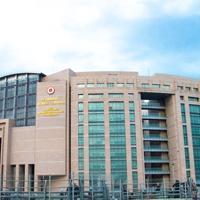
 Daily Agenda2 months ago
Daily Agenda2 months ago5 suspects nabbed for sharing information with Iranian intel
-
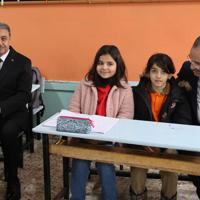
 Politics1 month ago
Politics1 month agoSoutheastern city enforces fines to tackle student absenteeism
-
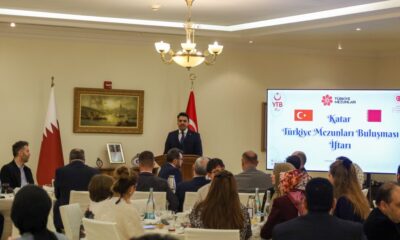
 Lifestyle2 months ago
Lifestyle2 months agoTürkiye’s Embassy in Doha hosts iftar for alumni to foster connections
-
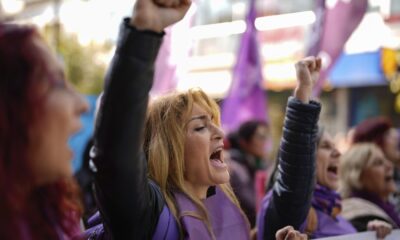
 Refugees2 months ago
Refugees2 months agoInternational Women’s Day: global protests demand equal rights
-

 Sports2 months ago
Sports2 months agoPaulista 19 maç sonra geri döndü, maç sonrası isyan etti
-

 Daily Agenda2 months ago
Daily Agenda2 months agoTrump hangi ülkelere yasak getirdi.
-
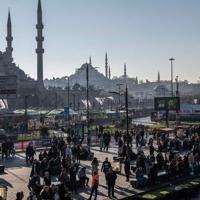
 Politics2 months ago
Politics2 months agoIstanbul ‘may break 110-year temperature record for March’
-

 Economy2 months ago
Economy2 months agoSweden to hold talks on countering soaring food costs

